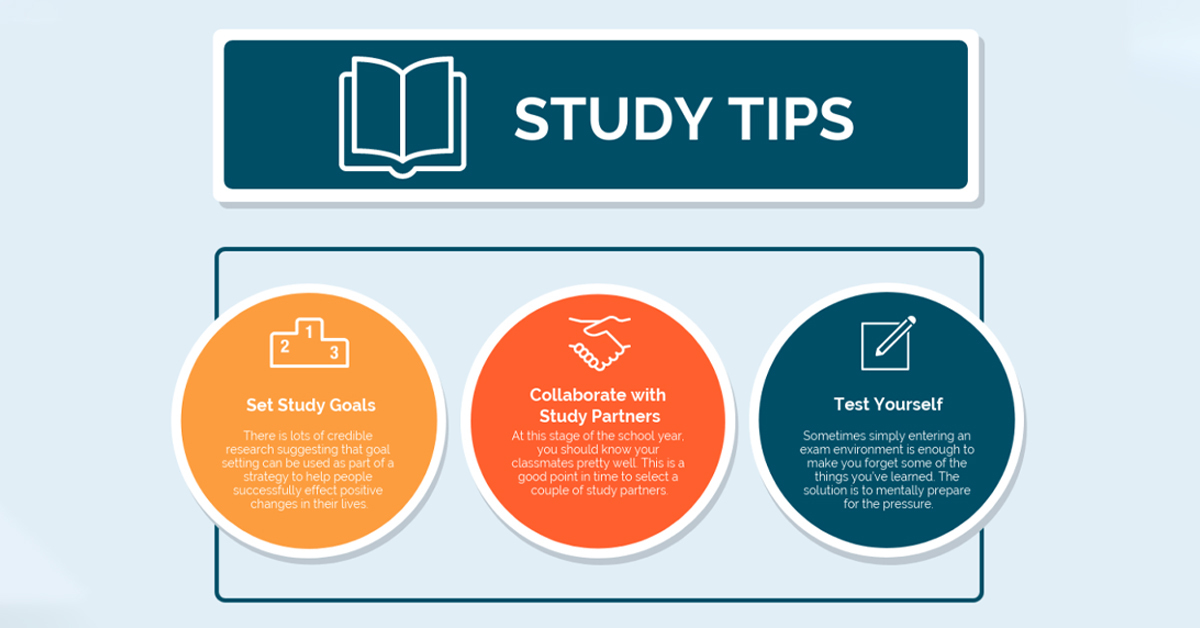Tips for Successful Exam Preparation and Test-Taking
Exams are a significant aspect of every student’s academic journey, serving as a measure of understanding, knowledge, and application. While the prospect of exams can be daunting, mastering the art of exam preparation and test-taking is a skill that can greatly enhance your performance and alleviate stress. In this guide, we will delve into a comprehensive array of strategies designed to equip you with the tools necessary to excel in your exams. From effective study techniques and time management to stress reduction and confidence building, we will explore every facet of successful exam preparation, empowering you to approach exams with confidence and achieve your best results.
Exams are a crucial part of the academic journey, testing your knowledge, understanding, and ability to apply what you’ve learned. While they can be nerve-wracking, effective exam preparation and test-taking strategies can make a significant difference in your performance. In this guide, we’ll explore a comprehensive range of tips to help you excel in your exams.
Exam Preparation: Building a Strong Foundation
Study Schedule: Create a well-structured study schedule that allocates sufficient time for each subject or topic. This prevents last-minute cramming and allows for gradual learning.
Effective Revision Techniques:
Employ active learning methods such as summarising notes, teaching the material to someone else, or creating flashcards. These techniques enhance understanding and retention.
Mindful Studying:
Practice mindfulness techniques like deep breathing or meditation to reduce stress and enhance focus during study sessions.
Use of Study Resources:
Utilise textbooks, online resources, lecture notes, and reference materials to gain a comprehensive understanding of the subject matter.
Time Management: Maximising Productivity
Time Management Strategies:
Break your study sessions into focused intervals using techniques like the Pomodoro Technique. This prevents burnout and maintains high levels of productivity.
Study Environment:
Create a quiet and organized study space free from distractions. A clutter-free environment enhances concentration and focus.
Study Techniques:
Experiment with different study techniques such as the Feynman Technique, SQ3R Method, or Cornell Note-Taking System to find what suits your learning style.
Stress Management: Staying Calm Under Pressure
Stress Reduction:
Engage in stress-reduction activities such as exercise, meditation, yoga, or hobbies. Managing stress positively impacts cognitive function and memory.
Test Anxiety:
Practice relaxation techniques before an exam to alleviate test anxiety. Positive affirmations and visualization can also boost confidence.
Confidence Building:
Regularly review your notes and test yourself with practice questions. Building confidence in your knowledge helps reduce anxiety.
Exam Strategies: Mastering Test-Taking
Test-Taking Strategies:
Familiarise yourself with various question formats (multiple-choice, essay, short answer) and practice answering sample questions. Focus on understanding the question before selecting an answer.
Concentration Techniques:
Minimise distractions during the exam by using techniques like controlled breathing or focusing on a specific point in the room.
Memory Enhancement:
Enhance memory recall by using mnemonic devices, creating visual associations, or connecting new information to existing knowledge.
Exam Readiness: Final Preparations
Practice Exams:
Take mock exams under timed conditions to simulate the real exam environment. This helps you gauge your pacing and identify areas that need improvement.
Note-Taking Methods:
Develop effective note-taking methods during your study sessions. Well-organized notes make revision easier.
Active Recall Technique:
Instead of passive reading, actively recall information from memory. Quiz yourself on key concepts or use flashcards to reinforce your understanding. This practice enhances long-term retention and strengthens your memory recall during exams.
Interdisciplinary Approach:
Connect concepts from different subjects to create a holistic understanding. This approach helps you see the bigger picture and identify relationships between topics, which can lead to better comprehension.
Group Study Sessions:
Collaborate with peers for group study sessions. Explaining concepts to others and engaging in discussions can provide new perspectives and deepen your understanding of the material.
Breakdown Complex Material:
Break down complex topics into smaller, manageable sections. Focus on understanding each segment before moving on, ensuring a strong foundation for more challenging concepts.
Regular Review:
Schedule regular review sessions to revisit previously learned material. Spaced repetition strengthens memory retention and reduces the likelihood of forgetting information over time.
Visual Aids:
Create visual aids such as mind maps, diagrams, or flowcharts to represent complex ideas visually. Visuals can help simplify information and make it easier to recall during exams.
Healthy Diet:
Maintain a balanced diet rich in nutrients, as proper nutrition supports cognitive function and brain health. Include foods rich in antioxidants, omega-3 fatty acids, and vitamins.
Hydration:
Stay hydrated, as dehydration can impair cognitive function and concentration. Carry a water bottle and take short breaks to hydrate during study sessions.
Active Breaks:
Incorporate active breaks into your study routine. Stretch, take a short walk, or do a quick exercise to boost blood flow and energy levels.
Variety in Study Materials:
Use different types of study materials to engage different senses. This could include watching educational videos, listening to podcasts, or using interactive online platforms.
Practice Handwriting:
When reviewing notes, consider rewriting them by hand. This process reinforces memory and improves understanding compared to simply reading typed notes.
Realistic Practice Exams:
Simulate exam conditions by taking practice exams in timed settings. Analyze your performance to identify weak areas and adjust your study plan accordingly.
Analyzing Mistakes:
Review your mistakes in practice exams to understand why you got a question wrong. This helps you identify patterns and adjust your approach to similar questions in the future.
Digital Detox:
Limit screen time before bed to improve sleep quality. Blue light from screens can interfere with the production of melatonin, a hormone essential for sleep.
Positive Visualisation:
Visualise yourself completing the exam. This technique can boost confidence, reduce anxiety, and create a positive mindset.
Time Allocation Strategy:
Before starting the exam, allocate a specific amount of time to each section or question based on their weightage. Stick to the allocated time to ensure you cover all sections.
Review Blank Spaces:
After completing the exam, review the paper for any unanswered questions or blank spaces. Sometimes ideas might come to mind later, and you can quickly jot them down.
Read Instructions Carefully:
Take a moment to read all instructions before beginning the exam. Understand the format, marking scheme, and any special instructions.
Review Answers:
After completing the exam, if time permits, review your answers. Correct any mistakes, clarify any unclear responses, and ensure your answers are accurate.
Maintain Positivity:
Maintain a positive attitude throughout the exam. If you encounter a challenging question, stay calm and move on. You can revisit it later with a fresh perspective.
Remember that every individual’s learning style and preferences are unique. Experiment with different strategies to determine what works best for you. Consistent effort, a positive mindset, and a well-rounded approach to exam preparation will set you up for success.
Conclusion
Successful exam preparation involves a combination of effective study techniques, time management, stress reduction, and strategic test-taking skills. By adopting a well-rounded approach and tailoring your strategies to your learning style, you’ll be better equipped to perform confidently and excel in your exams. Remember, consistency, dedication, and a positive mindset are key elements on your journey to exam success.
FAQs
Q1: How can I create an effective study schedule?
A1: Start by identifying the subjects or topics you need to cover. Allocate specific time blocks for each, considering your peak concentration times. Break down your study sessions into manageable intervals and include short breaks to prevent burnout.
Q2: What are some active revision techniques I can use?
A2: Active revision techniques involve summarising your notes, teaching the material to someone else, creating flashcards, and practicing past exam papers. These methods engage your brain and reinforce your understanding.
Q3: How do I manage test anxiety during exam preparation?
A3: Practise relaxation techniques like deep breathing, positive visualization, and progressive muscle relaxation. Preparing well in advance and practicing under timed conditions can boost your confidence and reduce anxiety.
Q4: What should I consider when selecting a study environment?
A4: Choose a quiet, organised, and well-lit space free from distractions. Make sure you have all necessary materials within reach to maintain focus during your study sessions.
Q5: How can I improve my concentration and memory during exams?
A5: Utilise concentration techniques like controlled breathing and focusing exercises. Enhance memory recall by using mnemonic devices, creating associations, and connecting new information to familiar concepts.
Q6: How can I build confidence before and during exams?
A6: Regularly review your notes and practice answering sample questions. Positive self-talk and visualization techniques can boost your confidence and reduce test anxiety.
Q7: What can I do to manage time effectively during exams?
A7: Familiarise yourself with the exam format and question types beforehand. Allocate time to each section based on its weightage and practice time management during mock exams.









